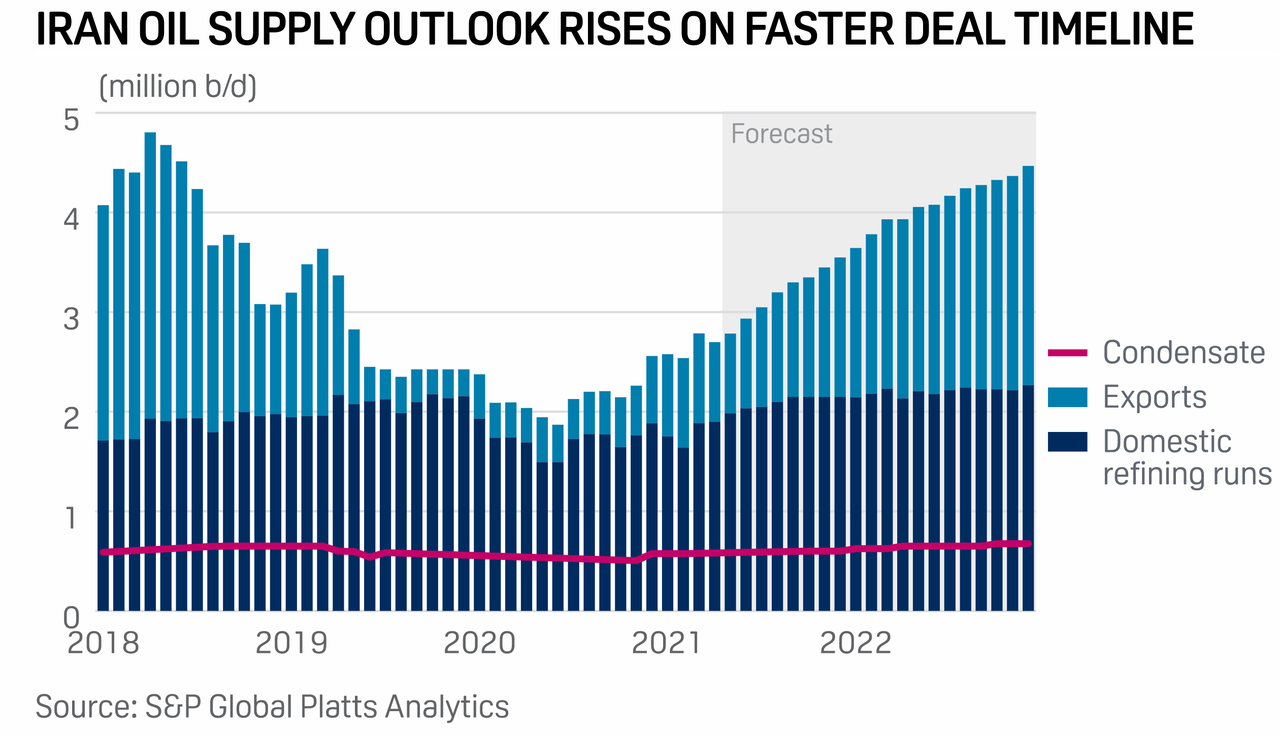Oil Rises Above $73 As Iran Talks Again Fail To Reach Deal
Iranian negotiators in Vienna confirm that they plan to continue pressing toward a deal after Iran's presidential election weekend, which saw ultraconservative judiciary chief Ebrahim Raisi emerge victorious: "we’ve reached a clear text on all the issues and what remains requires the decision of all parties. It’s not unlikely that the next round of talks will be the last," the foreign ministry optimistically stated. But this has been the constant refrain for weeks - still with no firm end in sight.
But with a more pessimistic tone, the West is warning there's nothing 'open ended' about the talks: "Western officials warned Tehran on Sunday that negotiations to revive its nuclear deal could not continue indefinitely, after the sides announced a break following the election of a new hardline president in Iran," according to Reuters. For the past month there's been intensifying prediction-making over just what the impact a "done deal" - if things in Vienna finally get there - will be on global oil prices, which would immediately see at least 2.5 million barrels of Iranian crude per day come flooding back to the market.
On Sunday at a moment negotiators adjourned the sixth round of meetings yet still with no deal reached, Bloomberg, observed, "Oil held near $72 a barrel as inconclusive nuclear talks between world powers and Iran -- which has elected a new hardline president -- allayed prospects for a swift revival of the Islamic Republic’s crude exports." Into Monday morning it's still climbing, with Brent Crude hovering just under $73.5 a barrel.

Brent crude starting a week ago has held at its highest price level in nearly 3 years, pushing up gas prices in the United States, also amid continued projections of the distinct possibility of $100 oil - especially should US-Iran indirect talks in Vienna drag on with no clear culmination on the horizon.
Bloomberg comments on this uncertain point as follows by noting "The failure to clinch an agreement puts additional pressure on other members of the OPEC+ coalition, which meets next week to consider restoring more oil output." Further, the report observes:
Crude is up almost 50% this year as major economies emerge from restrictions and lockdowns after the rollout of Covid-19 vaccinations worldwide. Demand has rebounded, especially in the U.S., Europe and parts of Asia. Consumption in China has exceeded pre-pandemic levels and India is showing signs of recovering from a deadly second virus wave that decimated its economy.
Recall that earlier in June oil rapidly dumped then jumped again on the mere hint of official news that the US had relieved sanctions on Iran - which it turned out was a US Treasury move only impacting one lone Iranian oil official.
As we noted at that time, Iran has previously said it intends to raise oil output by at least 3.3mln barrels within a month after the lifting of US sanctions, and as much as 4mln BPD within three months. Naturally, should that happen, the oil market will see a surge in new supply but even with millions of new barrels coming online, Goldman last month said that Iran would not have a major impact on the price of oil and wrote that "with growing evidence of the demand rebound, and imminent clarification on the likelihood of an Iranian return, we now see a clearer path for the next leg higher in oil prices, with the sell-off offering opportunities to position for the rally to $80/bbl."

But adding yet further to the unpredictability that the Iran factor will have on oil markets this summer, the Islamic Republic's sanctions-busting "ghost armada" is still going strong apparently, with a little help from China:
A 'ghost armada' of sanctions-busting tankers carrying black-market oil to China is bankrolling Iran’s secret nuclear programme, The Mail on Sunday can reveal.
The rogue state has almost doubled its fleet sailing under other countries’ flags to 123 in the past year, letting China smuggle in up to a million barrels of oil per day – or two-thirds of the UK’s daily use.
The Daily Mail further cites intelligence officials who "warn that the expanded fleet shows Iran, which announced hardliner Ebrahim Raisi as its president yesterday, is boosting the development of its nuclear capability despite international curbs."
While such tactics including tankers switching off their transponders or even deceptively sailing under other countries' flags are nothing new, what is new is the likely hesitancy of the Biden administration to crack down on the practice - as was attempted under Trump.
However, as of March, the Biden administration was quietly telling Beijing "There will be no tacit green light," according to reporting in FT at the time; however it remained that enforcement would only utilize "secondary sanctions" targeting Chinese companies caught transferring Iranian oil. It's as yet unclear the degree to which the Biden White House has followed through with its threat of "no green light".
“We’ve told the Chinese that we will continue to enforce our sanctions...There will be no tacit green light,” said a US official, indicating sanctions could be waived during potential #JCPOA talks.
— Maysam Behravesh میثم بهروش (@MaysamBehravesh) March 17, 2021
Trying to see the difference on #Iran btw Biden & Trump!https://t.co/BHHJQyffkF
"China was reportedly buying an average of 700,000 barrels of illegal Iranian oil a day up to April, peaking at a million barrels, making it Tehran’s main customer," the report continues. "Ghost armada ships carrying 18 million barrels are currently thought to be in the South China Sea."
Closer to home, Iran has meanwhile been actively prepping to get its global exports flowing once again via official means following years of Trump-imposed biting sanctions which particularly targeted Iran's oil exports, and with in some cases, Iranian tankers even being seized.
Disclaimer: Copyright ©2009-2020 ZeroHedge.com/ABC Media, LTD; All Rights Reserved. Zero Hedge is intended for Mature Audiences. Familiarize yourself with our legal and use policies every ...
more


